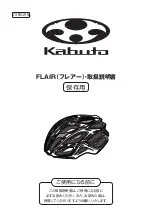
COOLING SYSTEM
85
14.1
Cooling system
101408-10
Water pump
in the engine circulates the coolant.
The pressure resulting from the warming of the cooling system is regulated by a valve
in radiator cap
. This ensures that operating the vehicle at the specified coolant tem-
perature will not result in a risk of malfunctions.
120 °C (248 °F)
Cooling is effected by the air stream.
The lower the speed, the less the cooling effect. Dirty cooling fins also reduce the cool-
ing effect.
(EXC-F SIX DAYS)
The radiator fan provides extra cooling. It is controlled by a thermoswitch.
14.2
Checking the antifreeze and coolant level
Warning
Danger of scalding
During motorcycle operation, the coolant gets very hot and is under pressure.
–
Do not remove the radiator cap, radiator hoses or other cooling system components when the engine is hot. Allow the
engine and cooling system to cool down. In case of scalding, rinse immediately with lukewarm water.
Warning
Danger of poisoning
Coolant is poisonous and a health hazard.
–
Avoid contact between coolant and skin, eyes and clothing. If it gets into your eyes, rinse immediately with water and con-
tact a doctor. Wash affected skin areas immediately with soap and water. If coolant is swallowed, contact a doctor immedi-
ately. Change clothes that have come into contact with coolants. Keep coolant out of the reach of children.
Condition
The engine is cold.
400243-10
–
Stand the motorcycle upright on a horizontal surface.
–
Remove the radiator cap.
–
Check antifreeze of coolant.
−
25…
−
45 °C (
−
13…
−
49 °F)
» If the antifreeze of the coolant does not meet specifications:
–
Correct the antifreeze of the coolant.
–
Check the coolant level in the radiator.
Coolant level
above radiator fins.
10 mm (0.39 in)
» If the coolant level does not meet specifications:
–
Correct the coolant level.
Alternative 1
Coolant (
Alternative 2
Coolant (mixed ready to use) (
–
Mount the radiator cap.
















































